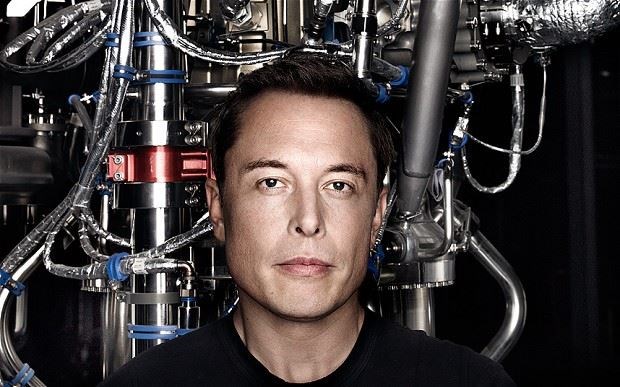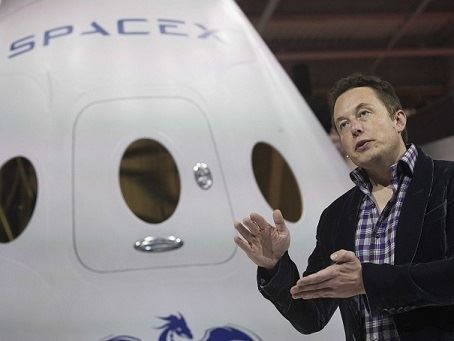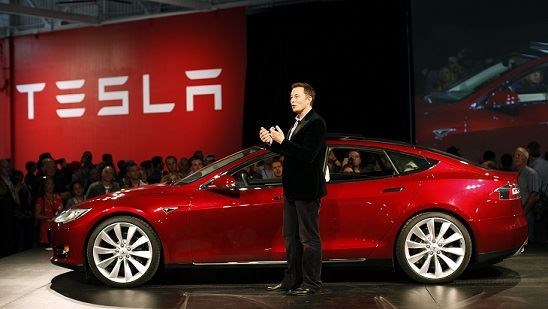 |
| (www.telegraph.co.uk) |
Since 1972 when the last Apollo mission landed on the moon, no one has been to the moon, or even out of Low Earth Orbit. One person who noticed, and asked why, is Elon Musk. He looked into why and found that the main reason space exploration slowed almost to a stop was cost. Elon Reeve Musk was born on June 28th, 1971 in South Africa. When he was first able, he emigrated to Canada, and later went to the United States to go to school. He learned a wide variety of things, mainly science related, then became an entrepreneur. He founded many companies, including Zip2, Paypal, Tesla Motors, SpaceX, and SolarCity, quickly becoming a multimillionaire. He started each company with an idea on how to improve the world. Space Exploration Technologies Corp. is Musk's company to make space travel cheaper and to push space exploration forward (Newsmakers: Elon Musk). A hero must be someone that is willing to do what is right for the benefit of the whole world, and not just himself. Elon Musk is an inspirational hero because he is trying to make space flight affordable for the common person, he is reducing our carbon footprint, and he is trying to save humanity from extinction.
 |
| (businessinsider.com) |
Elon Musk is reducing the cost of space travel for the average consumer, so that space exploration can continue with the enthusiasm of the 1960s. Companies in the aerospace industry, other than SpaceX, generally have high costs for all of their spacecraft. Musk says one reason why is that there is, "Not enough vertical integration. [...] SpaceX's vertical integration and the full control it affords Musk over what happens at SpaceX, but Musk also believes the vertical structure is critical to keeping costs down, and he criticizes the rest of the industry for not doing so" (Urban). "They outsource to subcontractors, and then the subcontractors outsource to sub-subcontractors, and so on. You have to go four or five layers down to find somebody actually doing something useful-actually cutting metal, shaping atoms. Every level above that tacks on profit-it's overhead to the fifth power" (Musk). Musk is able to reduce the price of his rockets unheard of amounts compared to the other companies, since SpaceX builds the majority of the parts themselves, rather than going out and ordering all the parts from an overpriced contractor (vertical integration). He is doing things that no one else is doing, because he sees benefit for everyone in doing so. In making the rockets cheaper, people who normally wouldn't have access to a rocket now have access to sending things to space for a small price compared to what it was before. Musk has already reduced the price of his rockets by a large amount from his company's vertical integration, but he thought that fifty-four million is still too expensive (Fernholz), so he came up with another idea to greatly decrease the price of the rockets: "The majority of the launch cost comes from building the rocket, which flies only once. Compare that to a commercial airliner - each new plane costs about the same as Falcon 9, but can fly multiple times per day[. ... A] rapidly reusable space launch vehicle could reduce the cost of traveling to space by a hundredfold. While most rockets are designed to burn up on reentry, SpaceX rockets are designed not only to withstand reentry, but also to return to the launch pad or ocean landing site for a vertical landing" (SpaceX). If SpaceX can reuse the still expensive rockets that are being launched many times, then the cost for rockets will be greatly decreased, since a new rocket doesn't need to be manufactured for every launch. This price drop would make the rockets available to many more people who would otherwise not be able to afford it. Even the average person would be able get into space, since instead of costing fifty-four million, it would only cost around two hundred thousand dollars per launch, the price of the fuel. (Fernholz) That allows many more people and organizations to do things in space, as well as go to space. Most manned launches would have more than one person on them, as to reduce the cost even farther. Musk wants the best for the world, so he is helping accelerate space exploration by making space access within the common person's reach.
 |
| (businessinsider.com ()) |
In addition to his impact to the Space industry, Elon Musk is also trying to help the world by doing things that reduce our species's carbon footprint, or CO2 emissions, to help prevent global warming. Musk saw that the United States of America was using petroleum and coal as a main source of energy. The coal was mainly going to energy production, and the petroleum was going to transportation (Urban)(Lawrence Livermore National Laboratory). The automotive industry was also not trying to transition to a cleaner energy source. Musk, "wanted to prove that electric cars could be better than gasoline-powered cars. With instant torque, incredible power, and zero emissions" (Tesla Motors). Musk founded the company to have an impact on the automotive industry, by pushing them to create greener cars. He created the company in hopes that it would positively affect the world and cause companies to start becoming greener. Musk has founded and co-founded many different companies with different goals to help the world. One example is SolarCity, which sells solar panels for the roofs of houses. "SolarCity, the company co-founded by Elon Musk, now produces the world's most efficient rooftop solar panels with a module efficiency of just over 22 percent" (Dent). Elon Musk co-founded a solar panel company to help the country convert to a more reliable energy source, solar energy. The more the world uses renewable energy sources, the less coal we will burn, releasing less carbon dioxide into the atmosphere. Musk has dedicated a lot of his time and effort into helping solve this worldwide problem that is causing global warming, and could lead to making Earth near uninhabitable.
Elon Musk is also trying to prevent humanity from becoming extinct by putting people on another planet in case something bad happens on Earth. In the future, mankind might create an artificial super intelligence, which might one day reason that it is not good to keep humans around: "He [Elon Musk] is very, very concerned about AI. [...] he fears that by working to bring about Superintelligent AI, we're 'summoning the demon,' but I didn't know how much he thought about the topic. He cited AI safety as one of the three things he thinks about most-the other two being sustainable energy and becoming a multiplanet species, i.e. Tesla and SpaceX. Musk is a [very smart person], and he knows a ton about AI, and his sincere concern about this makes me scared" (Urban). Musk sees that creating an Artificial Super Intelligence could be really bad for humanity. If humans were to be on two planets, and something really bad happened on one planet, then the humans on the other planet are still alive, and humanity is not extinct. This causes him to want to solve this problem even more. Many of his companies are to help him achieve his goal or making humans multiplanetary, which could save our race. Musk has a lot of ambitious life goals that benefit everyone on Earth, "one of [his] life goals is to put 1,000,000 people on Mars" (Urban). He thinks that this is so important to get a lot of people on another planet, because he is worried that something might happen to Earth, causing it to be uninhabitable. Musk's is living the life of trying to help the world and all of its people, not biasing towards himself. This shows that he does it to help the world, and not just himself, because if it were to help himself, then the goal wouldn't be a life goal, it would just be another of his minor goals. Musk really wants humans to become multiplanetary as fast as possible, since that would be the best for human life.
Elon Musk is inspirational to me because of the many selfless things that he did to benefit the entire world, rather than just himself. Musk has reduced the cost of spaceflight with his many new innovations to improve space flight and bring its price down. He is also helping to reduce the amount of CO2 pollution in the world caused by humans. One of Musk's life goal that he is working towards at a fast pace, is to get humans multiplanetary in case of a cataclysmic event, so that the human race will still survive. Elon Musk is an inspiration to me because he tries so hard to achieve goals for the benefit of the whole human race, and not just for his own personal benefit. A friend and coworker of Musk said, "The one major important distinction that sets him apart is his inability to consider failure. It simply is not even in his thought process. He cannot conceive of failure and that is truly remarkable. It doesn't matter if [he is] going up against the banking system (Paypal), going up against the entire aerospace industry (SpaceX) or going up against the US auto industry (Tesla). He can't imagine NOT succeeding and that is a very critical trait that leads him ultimately to success" (Cantrell). His friend sees that he is attempting the "impossible" to cause things to happen that will benefit the entire world. Elon Musk saw that space exploration had not explored any farther out since 1972, and he decided that he wanted to be the catalyst to reinvigorate space innovation. Quickly, he started making advances in that field and many others for the benefit of everyone in the world.
Works Cited
Cantrell, Jim. "How Did Elon Musk Learn Enough about Rockets to Run SpaceX? (Answer To)." Quora. N.p., 30 July 2014. Web. 05 Feb. 2016. <https://www.quora.com/How-did-Elon-Musk-learn-enough-about-rockets-to-run-SpaceX/answer/Jim-Cantrell>.
Dent, Steve. "Elon Musk's SolarCity Has the World's Most Efficient Solar Panels." Engadget. N.p., 02 Oct. 2015. Web. 02 Feb. 2016. <http://www.engadget.com/2015/10/02/elon-musk-solar-city-rooftop-efficiency/>.
"Elon Musk." Newsmakers. Vol. 2. Detroit: Gale, 2010. Biography in Context. Web. 29 Jan. 2016.
Fernholz, Tim. "SpaceX Just Made Rocket Launches Affordable. Here's How It Could Make Them Downright Cheap." Quartz. N.p., 4 Dec. 2013. Web. 04 Feb. 2016. <http://qz.com/153969/spacex-just-made-rocket-launches-affordable-heres-how-it-could-make-them-downright-cheap/>.
Lawrence Livermore National Laboratory. "Energy Flow Charts." Lawrence Livermore National Laboratory. Lawrence Livermore National Security, LLC; Department of Energy's National Nuclear Security Administration, 2015. Web. 08 Feb. 2016. <https://flowcharts.llnl.gov/>.
"SpaceX." SpaceX. SPACE EXPLORATION TECHNOLOGIES CORP., n.d. Web. 30 Jan. 2016. <http://www.spacex.com/>.
"Tesla Motors | Premium Electric Vehicles" Tesla Motors. N.p., n.d. Web. 02 Feb. 2016. <https://www.teslamotors.com/>.
Urban, Tim. "How (and Why) SpaceX Will Colonize Mars. | Elon Musk Part 3" Wait But Why. WaitButWhy, 16 Aug. 2015. Web. 03 Feb. 2016. <http://waitbutwhy.com/2015/08/how-and-why-spacex-will-colonize-mars.html/>.
Page created on 2/18/2016 12:00:00 AM
Last edited 2/18/2016 12:00:00 AM
